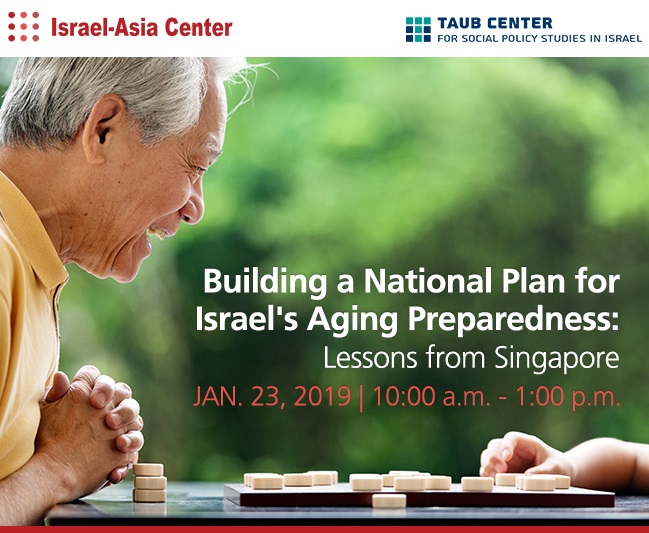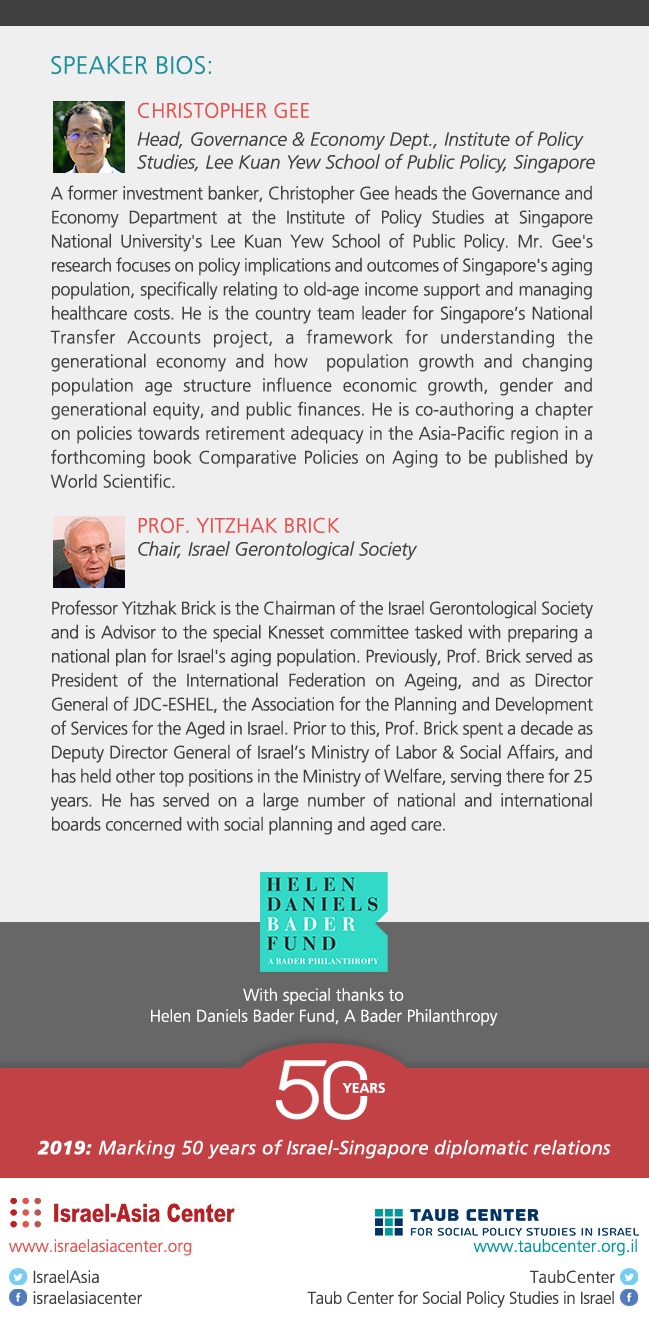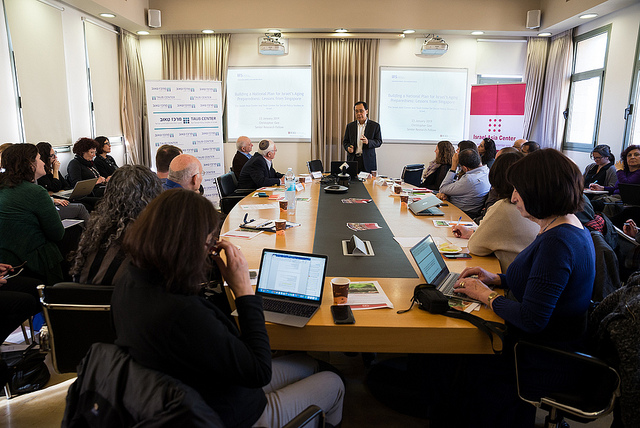EVENTSPAST EVENTS
Building a National Plan for Israel’s Aging Preparedness: Lessons from Singapore
Taub Center for Social Policy Studies in Israel
Two different societies – in Israel and Singapore – consider greying populations
איך מתמודדים עם ההזדקנות המהירה של האוכלוסייה בישראל? תלמדו מסינגפור

By 2035, Israel’s aging population is set to double, with 14.6% of the population projected to be over the age of 65. Asia’s aging population is projected to reach nearly 923 million by the middle of this century. As Israel develops its national plan on aging preparedness, this event looked at Singapore as a case study, whose median age grew from 29.8 in 1990 to 40 in 2016 and whose over-65 population will grow to 25% by 2030.
An island nation with an ethnically diverse population of comparative size to Israel, Singapore has prioritized the issue of its rapidly aging population since the 1980s, implementing a range of policies and schemes towards healthy aging. This roundtable explored the specific challenges facing Israel’s aging population, best practices Israel can learn and adapt from Singapore, and models for long-term financing of healthcare for the elderly.
Speakers:
- MK Tali Ploskov – Chair, Joint Knesset Committee on Creating a National Plan to Aid the Elderly
- Christopher Gee – Head, Governance & Economy Dept., Institute of Policy Studies, Lee Kuan Yew School of Public Policy, National University of Singapore
- Prof. Yitzhak Brick – Chair Israel Gerontological Society; Advisor to the Joint Knesset Committee on Creating a National Plan to Aid the Elderly
Moderator:
- Prof. Dov Chernichovsky – Principal Researcher & Health Policy Program Chair, Taub Center for Social Policy Studies in Israel

 Speaking at the event, Member of Knesset Tali Ploskov called Israel’s aging challenge the country’s “next social catastrophe”.
Speaking at the event, Member of Knesset Tali Ploskov called Israel’s aging challenge the country’s “next social catastrophe”.
“The biggest problem is that no one is looking forward,” said Ploskov, Chair of the Knesset Joint Committee on Creating a National Plan to Aid the Elderly, adding that the issue isn’t featuring in the elections agenda.
Director General of the Population and Immigration Authority and former Director General of Israel’s National Insurance Institute, Prof. Shlomo Mor-Yosef also commented on the absence of the issue in the run-up to the elections, saying someone in a high position in the government needs to adopt this as their mission.
In 2017, Israel established a Knesset joint committee tasked with developing a national plan for the country’s aging preparedness. However, while a proposal for a national plan has been drafted that addresses a range of challenges – from elderly care and assisted living to healthcare financing, it still lacks financial content.
“There is a need to translate the proposal into shekels,” said Prof. Yitzhak Brick, Chair of the Israel Gerontological Society and advisor to the Knesset joint committee.
“While Israel faces its own set of challenges, and one model can’t fit all, there is a great deal that Israel can learn from Singapore’s experiences and best practices in developing models for healthy aging, and for long-term financing of healthcare for the elderly,” said Rebecca Zeffert, founder and executive director of the Israel-Asia Center.
Singapore’s last action plan for successful aging, endorsed in 2016, encompasses a range of focal areas, from employability (ageless workplaces and lifelong employability), lifelong learning and senior volunteerism, to transport, housing and public spaces, to health and wellness, social engagement and inclusion and aged care services.
 “Two matters really stood out,” said Christopher Gee, a keynote speaker at the event and one of Singapore’s foremost experts on policy implications and outcomes of Singapore’s aging population, specifically relating to old-age income support and managing healthcare costs.
“Two matters really stood out,” said Christopher Gee, a keynote speaker at the event and one of Singapore’s foremost experts on policy implications and outcomes of Singapore’s aging population, specifically relating to old-age income support and managing healthcare costs.
“Firstly, how important it is to get going with preparing a society for the effects of aging. Singapore began preparations and planning in the 1980s, and over thirty years on, we’re still putting these plans into action. Secondly, the need for these plans to be financed. The financial reserves necessary to pay for one’s care in old age take time to build up. The development of mechanisms to accumulate the savings to pay for our old age care is an important but challenging task, especially when there are many competing demands on our resources in the near term.”
Gee heads the Governance and Economy Department at the Institute of Policy Studies at Singapore National University’s Lee Kuan Yew School of Public Policy, and heads Singapore’s National Transfer Accounts project.
The roundtable was supported by Helen Bader Daniels Fund – A Bader Philanthropy.

